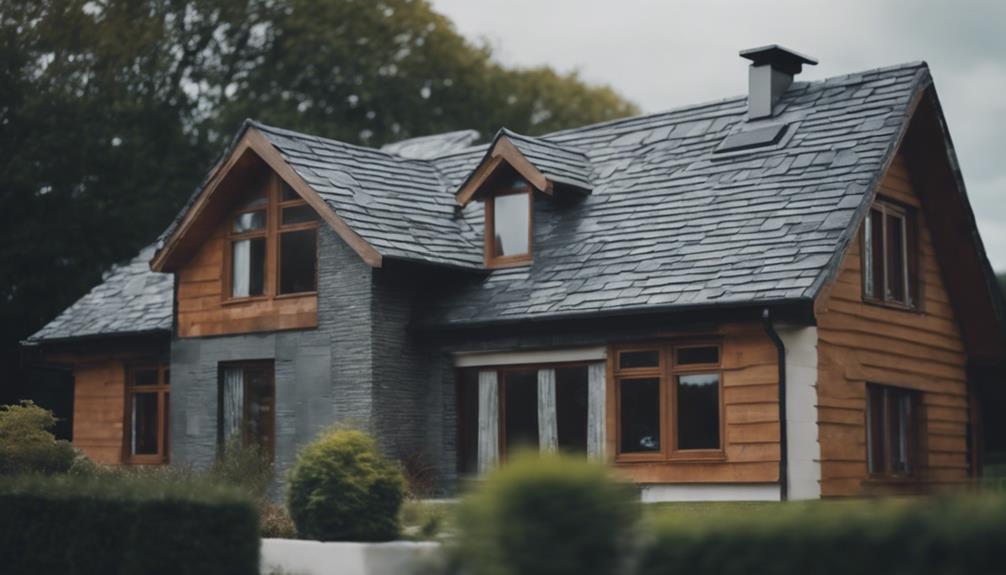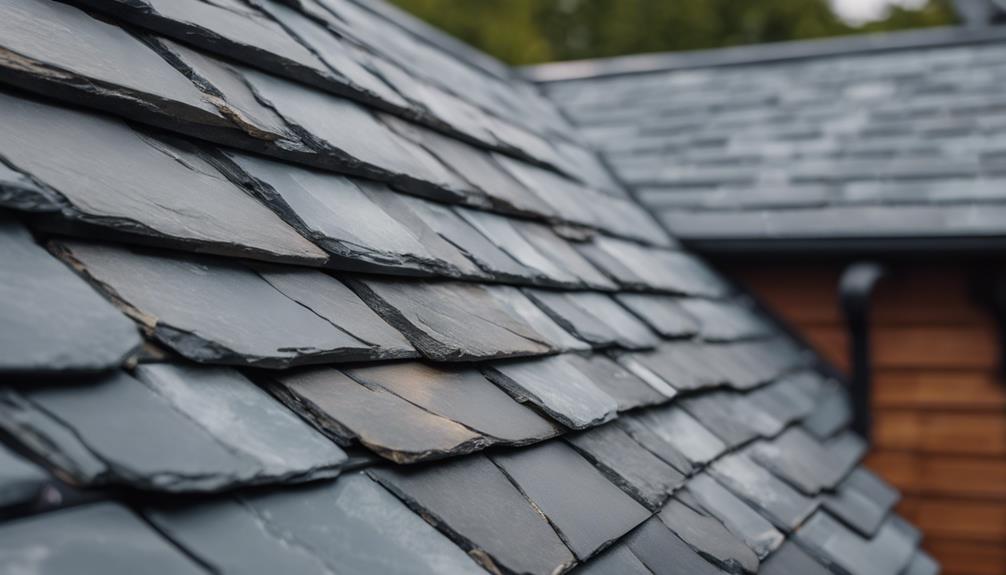What Are the Different Types of Roof Slates?
Tune in to discover the diverse types of slate roofing available and find out which one suits your home best.
Slate roofing has been a classic choice for homes due to its durability and elegant aesthetic. However, many are unaware of the different types of slate roofing available on the market today.
From traditional natural slate to modern synthetic options, each type offers unique characteristics and benefits that cater to various needs and preferences.
Understanding the distinctions between these slate roofing types is important for making an informed decision when it comes to selecting the most suitable option for your home.
What Is a Traditional Slate Roofing?
With a history dating back centuries, traditional slate roofing stands as proof of both durability and timeless beauty in the domain of roofing materials.
Traditional slate roofs is quarried from natural stone and offers unmatched elegance and a lifespan that can exceed 100 years when properly maintained. The process of crafting traditional slate roofing involves splitting the stone into thin, flat pieces that are then shaped and fitted onto roofs with precision.
One of the key advantages of traditional slate roofing is its resistance to fire, rot, and insect damage. Its natural composition also makes it eco-friendly compared to many other roofing materials. However, traditional slate roofing does require professional installation due to its weight and the expertise needed to make proper installation and long-term performance.
Despite the initial higher cost of traditional slate roofing compared to other materials, its longevity and classic aesthetic appeal make it a coveted choice for homeowners looking for a roofing option that combines beauty with functionality.
What Is Synthetic Slate Roofing?
Synthetic slate roofing offers a modern alternative to traditional slate roofing, replicating the aesthetic appeal of natural slate while providing additional benefits regarding cost and maintenance.
This type of roofing is made from a combination of engineered polymers or rubber compounds, designed to mimic the look and texture of natural slate. Key points of synthetic slate roofing:
- Durability: Synthetic slate roofing is highly durable and can withstand extreme weather conditions, making it a long-lasting roofing option for homeowners.
- Cost-Effective: Compared to natural slate, synthetic slate roofing is more affordable both in terms of material cost and installation expenses, making it an attractive option for budget-conscious individuals.
- Low Maintenance: Synthetic slate requires minimal maintenance compared to natural slate, reducing the need for frequent repairs and upkeep, thereby saving homeowners time and money in the long run.
What Is a Graduated Slate Roof?

Graduated slate roofing is a a specialized form of slate roofing installation, offers a unique and visually appealing design that showcases varying sizes of slate tiles to create a distinctive pattern on the roof.
This type of roofing is meticulously laid out with larger slate tiles at the eaves and smaller tiles towards the ridge. The graduated layout not only adds an aesthetic dimension but also serves a functional purpose by providing better wind resistance and durability.
One of the key benefits of graduated slate roofing is its ability to enhance the architectural character of a building. The varying sizes of slate tiles create a dynamic visual effect that can elevate the overall appearance of the roof. Additionally, the interplay of light and shadow on the graduated pattern can further accentuate the beauty of the roof.
Graduated slate roofing is known for its longevity and low maintenance requirements. The natural durability of slate, combined with the expert installation of varying tile sizes, ensures a durable and visually striking roofing solution for residential and commercial buildings alike.
How Do the Features of Different Roofing Materials Impact Their Benefits?
Exploring the diverse characteristics and benefits of each type of slate roofing provides valuable insights into the unique strengths and advantages that these roofing options offer for different architectural needs and preferences.
Slate roofing comes in various types, each with distinct features that cater to different requirements. Here are some key characteristics and benefits of each type:
- Traditional Slate Roofing: Known for its durability and timeless appeal, traditional slate roofing offers excellent longevity, often lasting over a century with proper maintenance. It provides a classic aesthetic that complements heritage or historic buildings.
- Textured Slate Roofing: Textured slate roofing adds dimension and visual interest to a roof. The varied textures can create a rustic or modern look, depending on the style of the slate tiles used. This type is popular for adding character to contemporary architectural designs.
- Sustainable Slate Roofing: Sustainable slate roofing is sourced from quarries that follow environmentally friendly practices. It offers a renewable and eco-conscious roofing option, making it ideal for environmentally conscious homeowners seeking a long-lasting and green roofing solution.
How Do I Choose the Right Roof Slates for My Home?

When selecting the appropriate slate roofing for your project, careful consideration of specific factors is essential to secure performance and longevity for your roof.
Firstly, assess the quality of the slate. Look for slates that are dense, non-porous, and durable to withstand harsh weather conditions.
Secondly, consider the colour and texture of the slate. Choose a colour that complements your overall building design and a texture that enhances the aesthetic appeal of your roof.
Additionally, evaluate the size and thickness of the slate tiles. Opt for sizes and thicknesses that are suitable for your specific roof pitch and design requirements.
Furthermore, inquire about the origin of the slate. Different regions produce slates with varying characteristics, such as water absorption rates and durability.
Lastly, ensure that the slate supplier offers a warranty and provides guidance on proper installation and maintenance practices to maximize the lifespan of your slate roof.
Frequently Asked Questions
Can Slate Roofing Be Easily Recycled or Repurposed After Its Lifespan?
Slate roofing can be recycled or repurposed after its lifespan. The durability and quality of slate make it an ideal material for reuse in various construction projects. Recycling slate helps reduce waste and promotes sustainability in the roofing industry.
How Does Slate Roofing Hold Up in Extreme Weather Conditions?
Slate roofing is renowned for its durability in extreme weather conditions. With its natural resistance to fire, rot, and insects, slate roofs can withstand hurricanes and heavy snowfall admirably, making them an ideal choice for areas prone to severe weather.
Are There Any Specific Maintenance Requirements for Different Types of Slate Roofing?
Specific maintenance requirements vary for different types of slate roofing. Regular inspection for cracks or missing pieces is important. Some types may need occasional resealing or repointing. Cleaning with a soft brush and mild detergent can help maintain the roof’s appearance and longevity.
Is There a Significant Difference in Cost Between Traditional Slate Roofing and Synthetic Slate Roofing?
There is a notable difference in cost between traditional slate roofing and synthetic slate roofing. Traditional slate is typically more expensive due to the labour-intensive installation process and sourcing of natural slate materials. Synthetic slate offers a more cost-effective alternative while maintaining durability and aesthetics.
What Are Some Common Misconceptions or Myths About Slate Roofing That Homeowners Should Be Aware Of?
Common misconceptions about slate roofing include it being fragile, expensive, and prone to breaking easily. Homeowners should be aware that with proper installation and maintenance, slate roofs can be durable, cost-effective, and long-lasting.